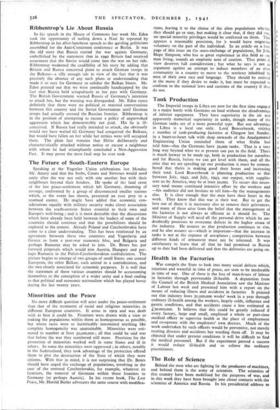The Future of South-Eastern Europe
Speaking at the • Yugoslav Union celebrations last Monday Mr. Amery said that the Serbs, Croats and Slovenes would need unity after the war not only with orie another but with their neighbours beyond their borders. He spoke of the fatal error of the last peace-settlement which left Germany, dreaming of revenge, confronted by a group of disconnected smaller nations which, as the event has shown, presented an easy prey to a rearmed enemy. He might have added that economic con- siderations equally with military security make closer association between the south-eastern • States essential to their own and Europe's well-being ; and it is most desirable that the discussions which have already been held between the leaders of some of the countries should continue and that the possibilities should be explored to the utmost. Already Poland and Czechoslovakia have come to a clear understanding. This has been reinforced by an agreement between these two countries and Yugoslavia and Greece to form a post-war economic bloc, and Bulgaria and perhaps Rumania may be asked to join. Dr. Benes has put forward proposals which would join Austria, Hungary and per- haps Rumania in the Polish-Czechoslovakian confederation. The picture begins to emerge of two groups of small States_ one central European, the other Balkan, each united in a confederation, and the two closely associated for economic purposes. It is well that the statesmen of these various countries should be accustoming themselves to the conception of a wider unity and a final ending to that political and economic nationalism which has played havoc during the last twenty years.






















 Previous page
Previous page